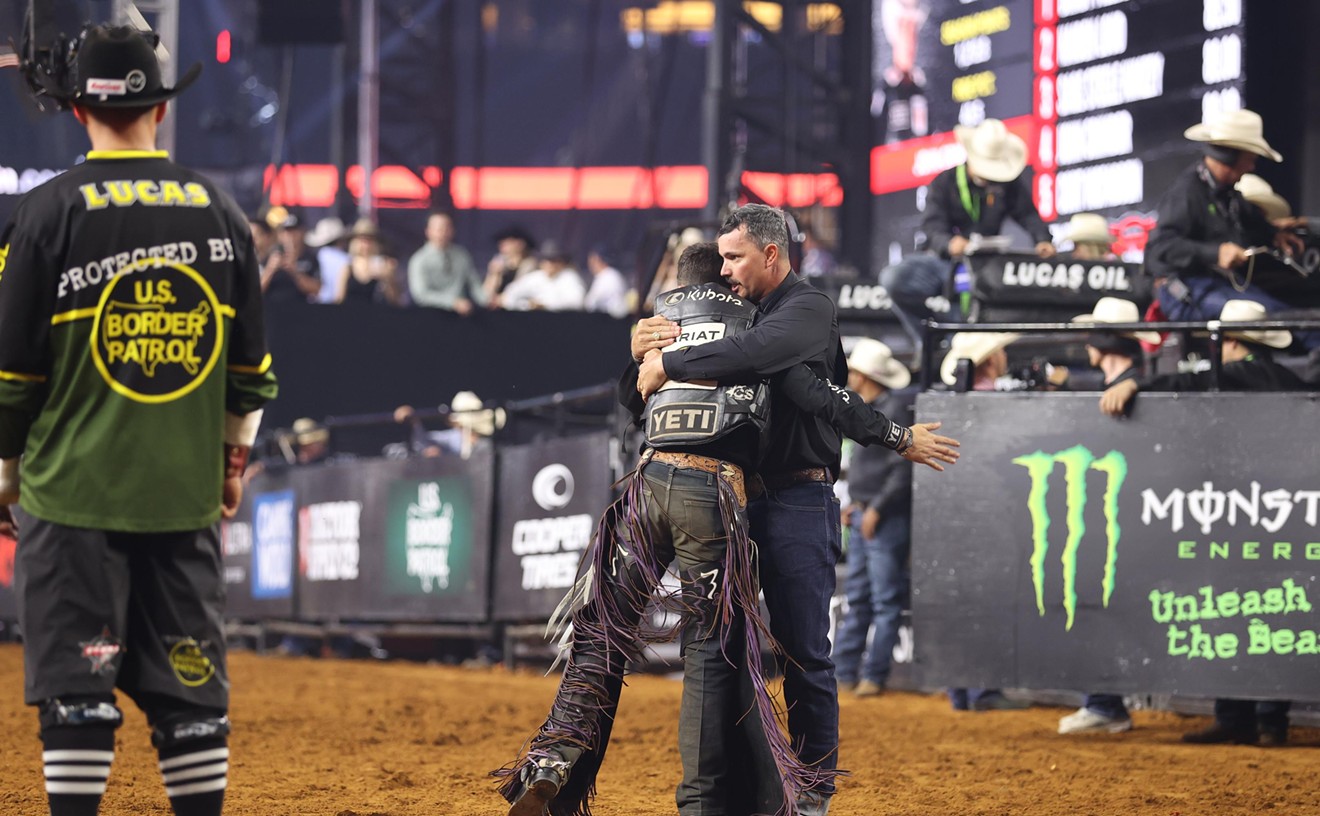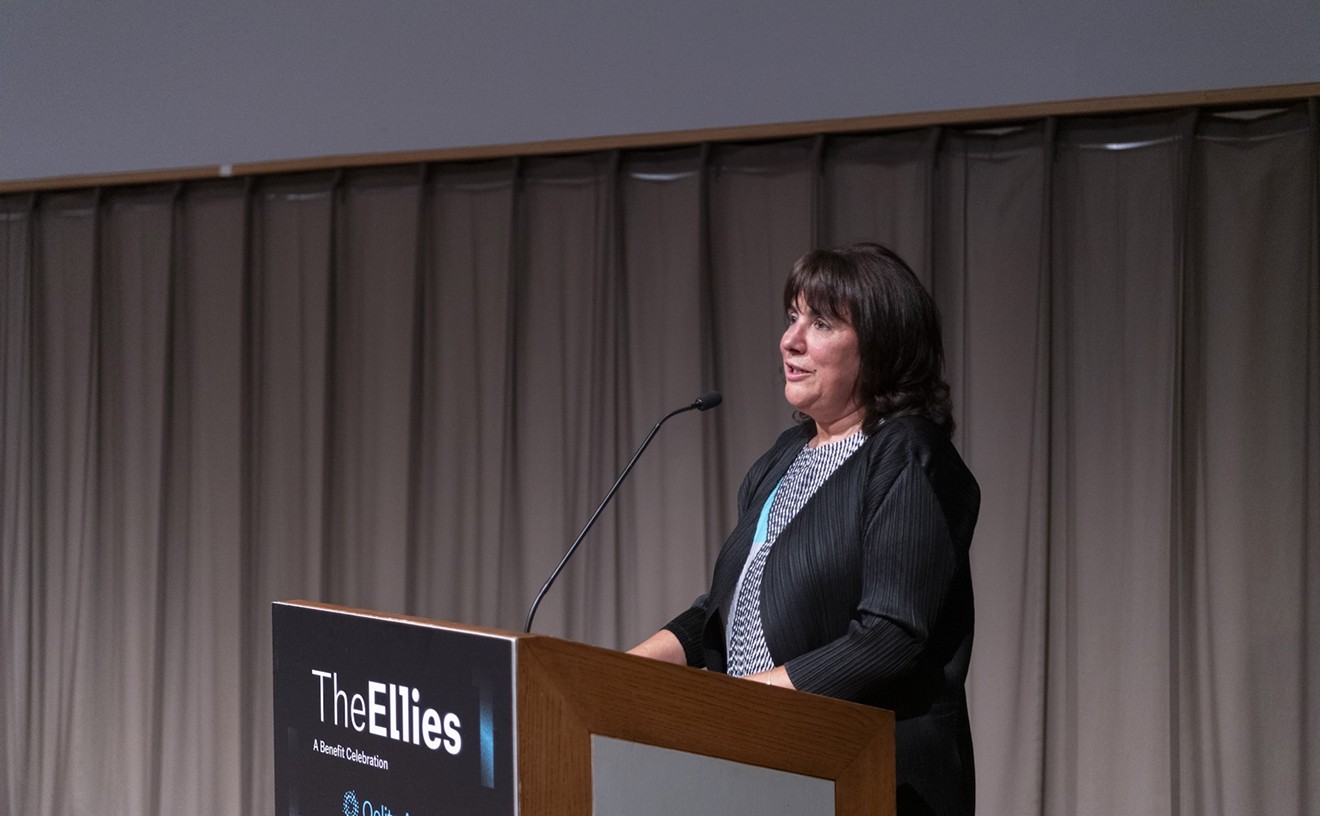David Mamet's Oleanna, when treated with even half of the passion and smarts evident in Max Pearl's blistering Pinecrest Rep production, is an exhilarating play. It's chock full of big ideas that hurtle across the stage, fueled by the audience's contempt — nay, hatred — of a student named Carol, and morally redeemed by the fact that Carol cannot quite be blamed for her stupidity. Rather, her dumb, brute malice seems congenital.
It is not her fault that she lacks the natural ability to eschew a stupid, stupid culture, one in which perception trumps meaning, and the ability to contextualize statements and actions has been lost. In Carol's world, the first response to any potentially offensive combination of words or deeds is not thought, but the taking of umbrage, and "opinions" and "feelings" are granted the respect once accorded "knowledge."
Oleanna takes place in the office of an education professor at an unnamed university. In the first of the play's three scenes, Carol, a struggling student (played by Bertha Leal) is consulting with the professor, Dr. John (Greg Schroeder). She is frustrated. She knows she's failing the class, even though she is a hard worker and she wants desperately to pass. She simply cannot understand the way he talks, his confrontational demeanor, or his five-dollar words. She believes, though never quite says (because the formulation is probably beyond her), that "education" consists of the absorption of facts. John offers her very few of these, and she is learning nothing.
One is inclined to blame somebody for this, but not Carol. In Dr. John, Mamet created one of his most annoying characters — well-meaning, but so caught up in the cultivation of his own image as a Great Teacher that he has no time to, you know, teach. Greg Schroeder plays him as a rabbity little man, whose pretentious speech is meant to convey gravitas, but who can summon only its pompous approximation. You can practically watch his ears twitch as he strains to sense in Carol's stuttered responses and halting questions some confirmation that his schtick is sufficiently impressive.
John hates Carol's latest paper. He reads a line back to her, maybe a little meanly. "What does that even mean?" he asks, disappointed with her, but also disappointed that his career has been reduced to throwing pearls before swine. Carol's line really is meaningless, and she's almost going to cry. But she perseveres: She really wants to understand, or thinks she does. "What do you mean, professor? What does that mean, professor? What's a 'term of art'?" That she is interested in learning stirs something in Dr. John, and he promises — perhaps out of kindness, or perhaps out of boredom — to give her an "A" in the class if she'll continue to visit him, one-on-one, for a series of frank talks about pedagogy.
Greg Schroeder is a soulful actor, and his Dr. John seems to mean what he says, even if he cannot do anything about it. In the next scene he will take three minutes to deliver two sentences — sentences that contain the words "heterodoxy," "orthodoxy," "posit," "covetousness," and "reprehensible," and which end with the phrase "insofar as concerns the material." This is not how you talk to an unlearned child accusing you of impenetrability. But John doesn't know that.
How much simpler Oleanna could be if John would only say, "People shouldn't go to college just because they think they're supposed to." Instead, to deliver the same point, he holds forth for five minutes about "wage-earning capacities" and "wringing some worth out of statistics." When he explains that higher education has become "a ritual [...] something all must be subjected to, something that all are entitled to," Carol bristles. She has worked hard to get to this school, and whatever her reason for doing so, she resents the implication that it might have been wrong. John explains that modern Americans are prejudiced in favor of higher education, but Carol is a product of her time. She doesn't hear meaning, only words. She asks, "How can you say that college is prejudiced?" Oleanna was written in 1992, so there is no way Dr. John can know that, by expecting this bad word to be understood in context, he is setting himself up for a Don Imusian fall.
Bertha Leal is a young actress, and in some ways she is very green. In the play's latter two scenes, after Carol has lodged a complaint with the college and all but ruined Dr. John's career, she delivers certain lines with a cavalier cruelty that seems borrowed from much-older movie villainesses — maybe Darryl Hannah in Kill Bill. Her attempt at a predatory smile (stick tongue against top two teeth, grin big, widen eyes to affect mock-friendliness) is a put-on, and makes her look even younger than she is.
Green or not, though, Leal is a prodigious talent. The contrast between her plaintive declaration of ignorance in the first scene — "What's a 'term of art'?" — and her haughty declaration of same in the second — "I don't know what a paradigm is" — is masterful. In the first instance, she wants to learn. In the second, she has become infected with the great malaise of her time: She is declaring her ignorance a right, which she expects her professor to honor. "A paradigm is... it's a, it's kind of a model," says John. Carol screams, "Then say that!"
Pinecrest Rep performs at the Banyon Bowl — a domed amphitheater, open to the air on one side, in the middle of Pinecrest Gardens. Oleanna's modest set is flanked by trees and greenery, and the dialogue is punctuated every now and again by the screaming of peacocks. The air is hot, and like the air in all green places in mid-May Florida, has a soupy consistency. (Woe to Greg Schroeder, who spends the play in long sleeves and a tie.) In Bertha Leal's better moments, you forget the hot, wet air, and shiver.











